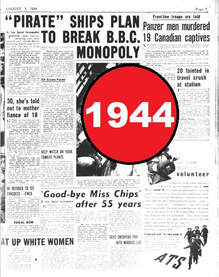|
Prince Charles explains 'pebble theatre'.
|
PEBBLE
|
|
Don Pierson [right] explains how a young Prince Charles made a request to join the Radio London fan club. |
|
|
Prince Charles explains 'pebble theatre'.
|
PEBBLE
|
|
Don Pierson [right] explains how a young Prince Charles made a request to join the Radio London fan club. |
|
 This is a British newspaper headline from 1944. World War II is not over, but two plans are underway to introduce British sponsored commercial radio broadcasting, and both have American backing. One of those plans was for "over 900 radio stations" (that is what this well-known newspaper reported in print!). Another plan was for radio broadcasting stations on ships. The bait being offered to get licences for land based stations was to provide what the British Broadcasting Corporation could not afford, and that was access to Hollywood's greatest radio stars by the listeners of British radio sets, which were capable of receiving more than BBC programming. In the early days of radio, some of the bigger U.S. radio network stations broadcast from the USA on shortwave, and they gained an audience in the British Isles. Standard radio sets often included long wave; medium wave and at least two short wave bands on their dial. Everyone was aware that the British Crown would not permit the liberated lands in Europe to once more permit transmitters to be hired out to British commercial radio entrepreneurs in the way they had before the War. If licences were not forthcoming, then ships would be used to broadcast from offshore. Programming would be relayed from the United States, either via shortwave re-transmission, or by transcription discs. The precursor to this audacious plan that appeared in the newspaper shown on this page, was the advent of the American Armed Forces Radio stations which for a time. peppered the British Isles before D-Day. But now, with the final months of the War playing out, a number of groups were beginning to formulate a new plan of action. It would be comprised of both British and American interests, and they would keep trying to introduce commercial radio until October 15, 1964. The timeline from 1944 to 1964 covers many events, not the least being the introduction of a modified form of independent British commercial television station franchises, with American connections. Tomorrow we will begin by examining those twenty years and the events that surrounded them. Nothing happened in isolation. Everything is interrelated, and tomorrow we will be examining the context of those events. [5/7/2020 - I have expanded and modified this item since original publication.] Comments are closed.
|
Our team produced this free radio program for PCRL in Birmingham.
It was repeatedly broadcast on and after October 20, 1985. Click & listen! Blog Archive
August 2023
Copyright 2021 with all rights reserved.
|
Index |
Library |
|
